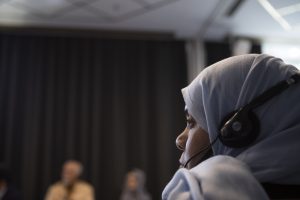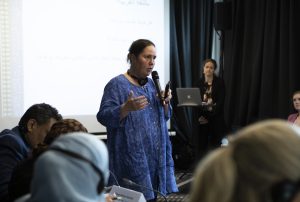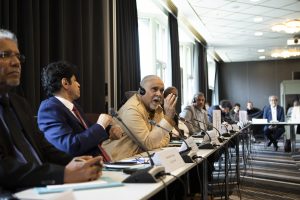Yemenis discuss autonomy and southern dialogue in Helsinki
CMI – Martti Ahtisaari Peace Foundation and Åland Islands Peace Institute hosted a group of Southern Yemenis in Helsinki on 14-15 June to discuss the form of the state and the potential for a southern dialogue in Yemen by exploring lessons learned from the examples of the Åland island and Aceh.

Southern Yemeni meeting, Helsinki 14.6.2022 / photo: Maria Santto / CMI
Since the end of the civil war in 1994, most Yemenis in the South have expressed discontent about their political status. Now, with the ongoing truce and the accompanying humanitarian confidence building measures, a more conducive environment for dialogue about the future state of Yemen and what is needed to unify the southern groups, is created.
To discuss issues related to governance and autonomy, CMI and Åland Islands Peace Institute invited representatives of the major Southern Yemeni groups to Helsinki for a two-day workshop. The 22 participants of the workshop represented nine political and social movements of Southern Yemen.
Experts of CMI and Åland Islands Peace Institute presented two examples of different autonomy models in Aceh and Åland. Director Sia Spiliopoulou Åkermark from Åland Islands Peace Institute reminded that process towards autonomy is always sparked by various motives.
“In the core of territorial autonomy lies various issues, such as language, culture, economy and security.”

Director Sia Spiliopoulou Åkermark at Southern Yemeni meeting, Helsinki 14.6.2022 / photo: Maria Santto / CMI
Minorities that are looking for autonomy often lack trust and inclusion in the political system, Åkermark highligted. Even democracies are ruled by majorities, and marginalized groups are often underrepresented. This highlights the importance of dialogue between social movements, such as Southern groups of Yemen.
However, the self-governing province of the Åland Islands is widely viewed as a successful compromise between independence and total integration. Also, the broad autonomy of Aceh in Indonesia – a conflict mediated by CMI’s Founder President Martti Ahtisaari and CMI – provides an example of “special autonomy”. Aceh has gained a greater income from its natural resources, freedom to run its internal affairs, organize its local government in line with local traditions and a greater say in its own security arrangements.

Southern Yemeni meeting, Helsinki 14.6.2022 / photo: Maria Santto / CMI
The workshop aimed to offer the participants a new viewpoint on different forms of autonomy, since the question of governance is topical in Yemen. The degree of Southern autonomy or independence is yet to be decided.
To conclude the workshop, the participants agreed on a joint statement, committing the participating groups to continued southern dialogue.